Mon 1 Feb 2010
MARTIN M. GOLDSMITH – Detour: An Extraordinary Tale.
O’Bryan House, Publishers; trade paperback, 2005. Hardcover edition: Macauley Co., 1939.
The people behind O’Bryan House, and that includes Richard Doody who wrote the introduction, have done the fans of noir fiction a tremendous favor in reprinting this book. If you are thinking, “What book?” and I imagine many of you are, you are in exactly the same position I was when I first heard about it.
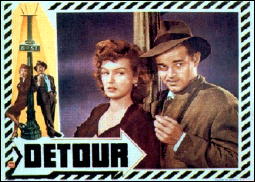
Now of course there is the Movie Version, which perhaps you have heard of. If there ever were a poll of noir film fans, the film that is based on this book would have to rank in the top two or three of all time. Forgive me, though, if I don’t review the movie, although I will have to admit that scenes from it were continually in my head when I was reading the book. I’ll review the book, though, if you so allow, and whatever movie you’re thinking of, I never heard of it.
Let me get back to the “favor” that I mentioned in the first paragraph. There are [at the time of this writing] two copies of the First Edition on ABE, neither of which has a dust jacket. The asking price for the first is $2500, and no, I did not lose the decimal point, so you can get up off your hands and knees and stop looking for it. The second copy is a mere $3500, but that one is signed by Mr. Goldsmith, who died in 1994, with a long inscription, so it is probably worth the money.
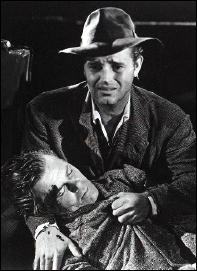
There may be other ways to obtain the paperback edition, but one good way may be to order it from Amazon, and at an even more reasonable $14.95. There should be other outlets where it’s available, and it’s a bargain price, no matter the venue.
To get started on the review, though, I hope that you don’t mind if I simply start off by quoting to you the first four paragraphs or so.
Once again, if you are a fan of noir fiction, and if you were to tell me that you could put the book down after reading this, most of the first page, frankly, I wouldn’t believe you.
One way or another, you’d be lying to me. Either you’re no fan of noir fiction, or you’re picking the book back up again when I’m not looking.
It seemed kind of crazy, that car stopping. I had begun to believe that only old jalopies and trucks picked up hikers any more. Bums are generally pretty dirty and good cars have nice seats. Then, too, it was a lonesome stretch in there and plenty can happen on a lonesome stretch.
The guy driving the car yelled at me over his shoulder. “Hey, you! Are you coming?” He acted as though he was in a great hurry, for he goosed his engine impatiently so I’d shake a leg.
I snapped out of it. It was hot as a bastard and I guess the sun was getting me. Somewhere back along the line I had lost my hat and the top of my head seemed to be on fire. Anyway, the last two hours I had been waving at cars more or less mechanically, not expecting anyone to stop. A few hundred of them must have whizzed by without even slowing down a little to give me the once-over. You know, hitch-hiking isn’t as popular out west as it used to be. I suppose that is why the real bums stick to the rails.
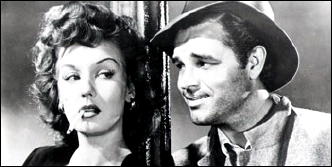
Telling this first part of the story is a down-on-his-luck jazz musician named Alex Roth. He is heading for California, and Hollywood in particular, since that is where his former live-in girl friend, Sue Harvey, has headed before him, only a week or ten days before they were to have gotten married. (She is the impulsive type, Alex tells the reader.)
Picking him up in the grey roadster is Charles Haskell, who has a wad of money in his billfold and who is not long for this world. His untimely death is an accident, but Alex knows that no one will believe him, given that small incident (thirty days) in Dallas, and given that he and Haskell do look alike… Well, you get the picture.
Backing up just a little, from page 32:
For when I pulled open that door, Mr. Haskell fell and cracked his skull on the running-board. He went out like a light.
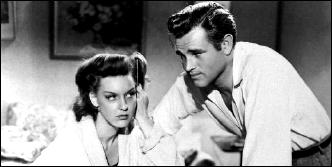
In the meantime, Sue herself is not doing so well. From pages 47-48, she expresses to the reader her distinctly discouraged view of Hollywood, where she is getting by (barely) as a waitress, and not as the star she had thought she was destined to be.
Or if so, not yet:
Goldsmith is less convincing as the voice of Sue Harvey than he is speaking as Alex Roth, but his portrayal of her is solidly etched in weariness and desire, and if one of the two of his two leading characters were to be considered hard-boiled, you have to know that it is not Alex.
And returning to that half of the story, the reader’s brain will yell out in warning (but to no avail) when Alex, in turn, picks up a hitch-hiker, female, a woman named Vera, and man, does the story explode from there, eventually taking a leap with one staggering coincidence that exceeds even the often crazy incoherence of a Cornell Woolrich short story or novel, but in this kind of story, the stops are usually pulled all of the way out, and if they weren’t, you’d complain.
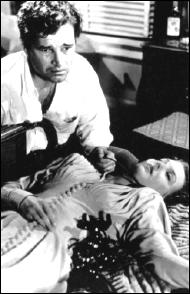
Backing up one more time, from page 84, after Vera has agreed to the lift, saying as she gets in, “Los Angeles is good enough for me, mister.”
These are the players. What you have just read includes considerably more quoting than I usually do, but there is little here, I guarantee you, that you will not glean from reading the few sentences of descriptive material on the back cover. There is plenty of story left, and on very nearly every one of the 158 pages in this book, there is another passage as quotable as any one of these.
To my mind, this is the great undiscovered American novel, told from the underside, and somehow in its understated raciness, marvelously reminiscent of those rather notorious pre-Code days at the movies. Which brings us back around to one of my opening comments. They did make a movie out of this book, did you know?
February 1st, 2010 at 9:50 pm
[…] agree wholeheartedly with the review Steve Lewis recently did of Goldsmith’s Detour. It’s every bit as fine as the much-lauded film version (which follows […]
February 2nd, 2010 at 7:21 am
Excellent job!
February 3rd, 2010 at 6:56 am
If there a well-restored version of this film available, by the way? I recently watched Too Late for Tears and was somewhat disappointed with the copy used.
February 3rd, 2010 at 9:18 pm
There is a remastered DVD offered for sale on Amazon, but you do have to read the comments. Here’s the key one:
” …technically, the quality of this disc is beyond terrible. It looks like a YouTube video does when you play it on a 50-inch plasma. Only worse — compression artifacts, tiling with squares the size of Post-it Notes, banding that looks like 16-bit grayscale. It made the whole thing unwatchable for me…”
This makes the unremastered version (at half the price) sound as though it would be the better buy.
On the other hand, it just doesn’t make sense to me to watch old movies from the 1940s on a 50-inch plasma screen. But since I don’t have one, what do I know?
— Steve
February 4th, 2010 at 12:04 am
Steve, I’m glad you bought the subject up about watching old movies on big screens. Since I mainly watch movies from the 1930’s through the 1950’s, they often are not remastered or cleaned up in any way. In fact many of the crime or film noir movies I watch are only available on so called bootleg dvds. These dvds are copies taken off a variety of sources: TV, VHS tapes, old film prints, etc.
To watch these old movies on a big screen is to see the imperfections magnified; as the viewer you quote above says “…it made the whole thing unwatchable for me.”
Even watching some of these films on a smaller 32 inch can be an ordeal, which is why I often watch them on an even smaller 20 inch TV. The quality appears alot better than on the bigger screens. I have the 20 inch in a smaller room where I can sit right in front of the screen, not too far away(in fact I’m right in front of the TV).
If you are an old movie fan, I would recommend that you take some dvds of the older films to the store and test them on the TV that you are thinking of buying. A football game broadcast in HD or a blu-ray dvd may look great on the bigger screen, but how does your dvd of a 1930’s or 40’s film look?
February 4th, 2010 at 3:56 am
I don’t have a 50 inch plasma either, but even on my TV sometimes the unrestored older films don’t show that well. For example Too Late for Tears and The Strange Love of Martha Ivers (what is about Lizabeth Scott?). I’ve never seen Detour and was wondering what’s the best way to go. You’d think this would be one Criterion would get a hold of, wouldn’t you?
February 4th, 2010 at 11:35 am
Amazon offers an “enhanced” version of TOO LATE FOR TEARS, but how much of an improvement it can be, I don’t know. The copy I watched ( https://mysteryfile.com/blog/?p=1303 ) had jumps and crackles and pops, but was still watchable, more or less.
I think the latter two complaints (crackles and pops) can be remedied, but without access to an original print, how can small gaps in the film itself be fixed?
As for Criterion deciding to do something some of these old film noir movies in bad shape, yes, absolutely! I’m all for it.
February 5th, 2010 at 1:26 pm
Some fine writing. It was cruel of you to give us the beginning and not post the whole book.
February 5th, 2010 at 1:40 pm
Ah, well. Sorry. What can I say? Do buy the book. It’s worth every penny. Guaranteed.
— Steve